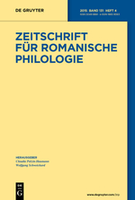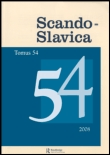
Gragoata-UFF
Scope & Guideline
Advancing knowledge through interdisciplinary dialogue.
Introduction
Aims and Scopes
- Linguistic Analysis and Pragmatics:
The journal publishes studies that delve into the intricacies of language use, including semantics, pragmatics, and syntactic structures across various languages, particularly focusing on Brazilian Portuguese and indigenous languages. - Cultural and Literary Criticism:
Gragoata-UFF encourages critical examinations of literary texts, exploring themes related to identity, post-colonialism, and the socio-political contexts that shape narratives. - Interdisciplinary Research:
The journal values interdisciplinary approaches that combine linguistics, literature, anthropology, and cultural studies, fostering a comprehensive understanding of the subjects under discussion. - Focus on Underrepresented Languages:
A unique contribution of the journal is its commitment to exploring languages and literatures that are often marginalized, facilitating a platform for voices that are less frequently heard in academia. - Ecocritical Perspectives:
Recent publications indicate a growing focus on the relationship between literature, nature, and ecological issues, reflecting a commitment to addressing contemporary environmental challenges through a literary lens.
Trending and Emerging
- Indigenous Languages and Cultures:
There is a marked increase in studies addressing indigenous languages and their cultural significance, reflecting a growing recognition of the importance of preserving and understanding these languages within the broader context of linguistic diversity. - Ecocriticism and Environmental Literature:
Emerging themes around ecocriticism and literature's role in addressing environmental concerns are becoming prominent, indicating a response to global ecological crises and a desire to explore literature's engagement with nature. - Decolonial and Post-Colonial Perspectives:
A significant trend is the adoption of decolonial and post-colonial frameworks in literary and linguistic studies, emphasizing the need to critique and re-evaluate narratives shaped by colonial histories. - Sociolinguistics and Language Ideologies:
There is an increasing focus on sociolinguistic studies that examine language ideologies, particularly in relation to migration, identity, and social justice, highlighting the journal's engagement with contemporary social issues. - Interdisciplinary Methodologies:
The journal is witnessing a trend towards interdisciplinary methodologies, where scholars are blending insights from linguistics, cultural studies, and semiotics to provide richer analyses of texts and language.
Declining or Waning
- Traditional Linguistic Norms:
There has been a noticeable reduction in papers focusing solely on traditional linguistic norms and prescriptive grammar, as the journal shifts towards more descriptive and sociolinguistic perspectives. - Historical Linguistics:
Papers centered exclusively on historical linguistics and diachronic studies have declined, suggesting a move away from historical analysis towards contemporary linguistic practices and issues. - Local Dialect Studies:
Research focused on very localized dialects or idiolects appears to be less frequent, possibly as scholars prioritize broader sociolinguistic phenomena and their implications on identity and power. - Monolingualism in Language Education:
The journal has seen fewer discussions regarding monolingual approaches in language education, reflecting a broader acceptance of multilingualism and its pedagogical importance. - Traditional Literary Canon Studies:
There seems to be a waning interest in studies that strictly adhere to traditional literary canons, as the journal increasingly embraces post-colonial and decolonial critiques that challenge established norms.
Similar Journals

Estudios Romanicos
Exploring the Depths of Linguistic and Literary ScholarshipEstudios Romanicos, published by the Universidad de Murcia, is an esteemed open-access journal that has significantly contributed to the fields of Linguistics, Language, Literature, and Literary Theory since its inception in 1978. With an impact factor that elevates it to Q3 in Linguistics and Language and Q2 in Literature and Literary Theory as of 2023, this journal ranks impressively within its categories—placing it in the 76th percentile for Literature and Literary Theory, making it an essential resource for academic discourse. Based in Murcia, Spain, the journal embraces an open-access model, ensuring that its rich content is accessible to a global audience—fostering collaboration and cross-disciplinary research. The convergence of knowledge from diverse linguistic and literary perspectives allows researchers, professionals, and students alike to engage with cutting-edge scholarship and extend the boundaries of their own studies.

BOLETIN DE LA REAL ACADEMIA ESPANOLA
Bridging Theory and Practice in Language StudiesBOLETIN DE LA REAL ACADEMIA ESPANOLA, published by the Real Academia Española, serves as a central conduit for scholarly discourse in the fields of Linguistics and Language. With an ISSN of 0210-4822 and an E-ISSN of 2445-0898, this esteemed journal has been disseminating impactful research since its inception in 2003. As a recognized Q2 journal in Linguistics and Language for 2023, it ranks in the 45th percentile in Arts and Humanities and 42nd percentile in Social Sciences according to Scopus metrics, reflecting its solid position in academic circles. Although not an open-access journal, it remains a crucial resource for those engaged in the vibrant study of language, providing insights that inform both theoretical frameworks and practical applications. Researchers, professionals, and students alike will find prominent studies and discussions that contribute to the evolution of linguistic scholarship. The journal is published in Madrid, Spain—an environment rich in linguistic heritage that further enhances its significance in the global academic community.

LINGUISTIQUE
Nurturing a Community of Language ScholarsLINGUISTIQUE, an esteemed journal published by PRESSES UNIV FRANCE, serves as a vital platform for scholarly discourse in the fields of linguistics and language studies. With its ISSN 0075-966X and E-ISSN 2101-0234, this French journal has been a significant contributor to the understanding of linguistic phenomena since its inception in 2004, and it continues its journey through to 2024. Although currently categorized in the Q4 quartile for both Arts and Humanities (miscellaneous) and Linguistics and Language, its commitment to publishing quality research encourages a diverse range of articles, reviews, and innovative studies. Positioned in the 32nd and 29th percentiles for its respective fields according to Scopus rankings, LINGUISTIQUE is dedicated to advancing knowledge and stimulating engagement among researchers, professionals, and students alike. While it does not offer open access, the journal remains an essential resource for those who seek to deepen their understanding of linguistic principles in a global context, facilitating a richer discourse that connects theory with practice.

Anales de Filologia Francesa
Elevating French Philology to New HeightsAnales de Filologia Francesa is a prominent academic journal dedicated to the fields of French philology, linguistics, and literature, published by UNIV MURCIA. Since its transition to open access in 1985, this journal has enabled a wider dissemination of knowledge, fostering scholarly communication among researchers, professionals, and students alike. Based in Spain, Anales de Filologia Francesa plays a pivotal role in addressing current issues and advancements within its scope, underscored by its notable rankings within the Scopus database, where it places in the second and third quartiles across various disciplines related to literature and linguistics. With a commitment to publishing high-quality research, this journal is essential for those looking to engage with cutting-edge studies in French literary theory, language use, and educational practice.

ZEITSCHRIFT FUR ROMANISCHE PHILOLOGIE
Bridging Historical Insights with Modern Literary DiscourseZEITSCHRIFT FUR ROMANISCHE PHILOLOGIE, published by Walter de Gruyter GmbH, stands as a prominent peer-reviewed journal dedicated to the fields of Linguistics, Literature, and Literary Theory. Established in 1877 and continuing its legacy to the present day, this esteemed journal offers a platform for comprehensive scholarship that explores the intricacies of Romance languages and their literary heritage. With a notable Q1 ranking in Literature and Literary Theory and a Q2 ranking in Linguistics and Language, it has secured its place among leading resources in the humanities. Researchers, educators, and students benefit from its rich historical context and current contributions to the understanding of Romance languages and literature. Though currently not available as Open Access, the journal prioritizes the dissemination of high-quality research, making significant strides in fostering academic dialogue and advancement. Its address at Genthiner Straße 13, Berlin, Germany, situates it in a hub of scholarly activity, bridging the past with contemporary literary discourse.

Revista da Anpoll
Empowering academics with free access to vital findings.Revista da Anpoll is a prestigious academic journal dedicated to the fields of Letters and Linguistics, published by the ASSOC NAC POS-GRADUACAO PESQUISA LETRAS & LINGUISTICA in Brasilia, Brazil. Since its inception in 1994, this Open Access journal has aimed to foster scholarly communication and lead discourse in the linguistic and literary disciplines, allowing researchers and practitioners free access to cutting-edge research and findings. Although it does not currently have an H-index, the journal continues to attract high-quality submissions from experts in its field, contributing to the global academic community. By offering a platform for innovative studies and discussions, Revista da Anpoll plays a critical role in advancing knowledge and practice within linguistics and literary studies, making it an invaluable resource for academics, professionals, and students alike.

Scando-Slavica
Illuminating the Rich Tapestry of Scandinavian and Slavic ScholarshipScando-Slavica is a renowned academic journal published by ROUTLEDGE JOURNALS, TAYLOR & FRANCIS LTD, specializing in the rich interplay of Scandinavian and Slavic studies. With its ISSN 0080-6765 and E-ISSN 1600-082X, the journal has been a critical resource for scholars since its inception in 1954, covering a wide range of disciplines including archaeology, cultural studies, history, linguistics, and literature. As of 2023, it has consistently ranked in the third quartile across various categories, indicating its influential role in disseminating innovative research within the arts and humanities. With a focus on interdisciplinary dialogue, Scando-Slavica aims to foster a deeper understanding of cultural exchanges and linguistic connections, making it an essential read for researchers, professionals, and students interested in exploring the complexities of Nordic and Slavic interactions. While currently not an open access journal, its contributions have garnered substantial citations, bolstering its academic impact and relevance in a diverse scholarly landscape.

Revista Letras
Connecting Ideas in Literature, Linguistics, and BeyondRevista Letras (ISSN: 0100-0888, E-ISSN: 2236-0999) is a prominent academic journal published by Universidade Federal do Paraná, Editora, renowned for its commitment to advancing knowledge in the fields of literature, linguistics, and cultural studies. As a pivotal platform for scholarly exchange, the journal aims to foster rigorous research and interdisciplinary dialogue, addressing themes relevant to both Brazilian and global literature. With an emphasis on open access, Revista Letras ensures that its research is widely disseminated, enabling greater accessibility for researchers, professionals, and students alike. Located in Curitiba, Paraná, Brazil, the journal actively participates in the academic community, contributing to the ongoing conversation surrounding literary and linguistic studies. Its dedication to quality scholarship makes it an invaluable resource for anyone looking to deepen their understanding of these dynamic fields.

Slavia Meridionalis
Exploring the rich tapestry of Slavic culture and history.Slavia Meridionalis is a distinguished open-access journal published by the Polish Academy of Sciences, Institute of Slavic Studies, dedicated to advancing scholarly discourse in the fields of Anthropology, Cultural Studies, History, Linguistics and Language, and Literature and Literary Theory. With its ISSN 1233-6173 and E-ISSN 2392-2400, this journal has made significant strides in promoting research since its inception in 2014. Operating from Warsaw, Poland, Slavia Meridionalis aims to serve as a pivotal platform for researchers and students alike, fostering interdisciplinary collaboration and knowledge dissemination. The journal holds respectable rankings in its various categories, some achieving Q3 status, which reflects its commitment to quality scholarship within the academic community. By providing open access to its readership, Slavia Meridionalis ensures that pivotal research is readily available for the global audience, thus enhancing its relevance and impact across diverse fields.

Linguistica y Literatura
Innovating Insights in Language and Literary ScholarshipLinguistica y Literatura is a distinguished academic journal published by the Universidad de Antioquia within the Department of Linguistics and Literature. With a strong focus on the interdisciplinary study of language and literature, this journal serves as a critical platform for researchers, educators, and students alike to explore innovative scholarship and emerging trends in the field. Though specific impact metrics such as HIndex and Scopus ranks are not provided, the journal remains an essential resource for those dedicated to advancing linguistic and literary analysis in the Hispanic context. The journal operates under a traditional access model, ensuring broad distribution and visibility among academics. By fostering discussions that illuminate the complexities of language and literary expression, Linguistica y Literatura is poised to contribute significantly to the ongoing dialogue in both disciplines, promoting richer understanding and engagement in the study of human communication and culture.